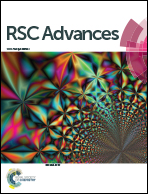Analysis of sodium generation by sodium oxide decomposition on corrosion resistance materials: a new approach towards sodium redox water-splitting cycle†
Abstract
In this study, the investigation of materials with corrosion resistance was carried out to prevent side reactions caused by sodium oxide (Na2O) in the Na-redox thermochemical water splitting cycle, and essential operational conditions for sodium (Na) generation from Na2O were also investigated. Thermal desorption spectroscopy and X-ray diffraction techniques at altered conditions were mainly used for the experimental investigation. Numerous types of materials were tested to find materials with high resistance towards corrosion and to understand essential thermal decomposition processes of Na2O. In addition, under different temperatures and pressure conditions, the thermodynamic calculation of Gibbs free energy was performed to obtain experimental results. As a result, a Ti alloy showed significant resistance towards the corrosive reaction by Na2O. The obtained experimental and simulated results support the direct decomposition of Na2O to form Na and O2 below 600 °C under low partial pressure conditions. The optimized conditions for Na generation with the Ti alloy sample can be used for low temperature water splitting.



 Please wait while we load your content...
Please wait while we load your content...